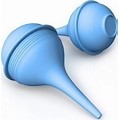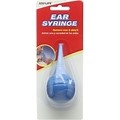Opening Times | NHS App | Contact Us
CQC Rating Good
Ear Wax –Self Help guide
Carlisle Healthcare is committed to providing best practice and high quality care to our patients.
Ear irrigation is no longer considered 1st line treatment for clearing ear wax, and other self- help measures should be undertaken initially.
Current guidelines are that ear drops should be used to soften the wax which will enable the natural movement from the ear.
What is Wax?
Ear wax is a natural build-up of dead cells, hair, foreign material such as dust and cerumen.
Cerumen is a natural wax produced by the glands in the ear. It forms a protective coating of the skin in the ear canal. Small amounts are made all the time. Flakes or crusts of earwax break off and fall out of the ear from time to time.
Points to Remember
- Ear wax is normal and it provides protection for your ears.
- Your ears are self –cleaning
- The movement of your jaw whilst eating and talking helps to move the wax along the canal
- A plug of ear wax is not a serious problem. You only need to remove earwax if it is causing symptoms
- Such as dulled hearing or when fitting a hearing aid.
What makes ear wax worse?
The amount of wax produced varies from person to person
Somme people produce excessive amounts of wax and this can block the ear canal.
Wearing a hearing aid, ear plugs or head phones can interfere with wax expulsion
Narrow or hairy ear canals
If you are elderly the wax produced may be harder and drier.
Dry skin in people who have eczema or psoriasis.
What you should NOT do
Do not use a cotton bud to clean your ear. This forces the wax deeper into the canal and can cause damage, trauma and possible infection
If your ears are itchy, try not to scratch or rub them with your finger nails or any other objects.
What Helps
- Try and keep your ears dry. When washing your hair, showering or swimming.
- Putting some Vaseline on the inner part of your ear can help
- Don’t put your head under water when bathing.
- Some people are troubled by repeated build- up of earwax and may benefit from regular use of drops
What can you do to manage the problem?
- Using Ear drops
- Ear drops alone will clear a plug of earwax in most cases. Put 2- 3 drops of normal olive oil down the
- Ear using a dropper, 2-3 times a day for 2-3 weeks. This softens the wax so that it runs out on its own Accord without harming the ear
- You can continue for any length of time but 3 weeks is usually Enough
- Surprisingly you will not necessarily see wax come out. It often seems to come out unnoticed
- If olive oil does not work you can buy sodium bicarbonate drops from your local pharmacy
- If you wear a digital hearing aid then sodium bicarbonate drops are advised rather than oily drops
Do not use drops if you have a hole in your ear drum (called a perforation)
How to use ear drops
Warm the drops to room temperature before using them
Pour a few drops into the affected ear
Lie with the affected ear uppermost when putting in drops
Stay like this for 10 minutes to allow the drops to soak into the ear wax
Preventing ear wax build up
You can’t prevent earwax. It’s there to protect your ears from dirt and germs.
However you can keep using drops to soften the wax. This will help it fall out on its own and should prevent blocked ears. If you are prone to repeated wax build up you can continue to use olive oil drops twice a week to prevent recurrence.
Alternatively
There are now a number of over- the counter kits available from pharmacies. These contain a wax
Softener as drops which you use for 3-4 days and a small bulb syringe to enable you to remove the
Wax from your ear canals yourself. These kits can be easily purchased from your local pharmacy or
Online by searching ‘Ear wax bulb’. The specially designed syringes are designed to create enough gentle water pressure to clear wax out of the ear without causing damage to the ear drum.
Always use hand temperature tepid water if using the bulb syringe, having used olive oil drops in the previous few days


Always follow the instructions provided in the kit
Research shows that bulb syringing is effective and acceptable to patients and could significantly reduce the use of NHS resources
Certain private providers offer ear irrigation locally (Specsavers currently) but you will charged for this.
When to seek help from the Surgery
If you are experiencing the following symptoms please contact the surgery via econsult or telephone (01228 588121)
- Pain
- Discharge or bleeding from the ear
- Sudden deafness
- Dizziness
- Foreign bodies (you may be advised to attend A&E)
We use cookies to help provide you with the best possible online experience.
By using this site, you agree that we may store and access cookies on your device. Cookie policy.
Cookie settings.
Functional Cookies
Functional Cookies are enabled by default at all times so that we can save your preferences for cookie settings and ensure site works and delivers best experience.
3rd Party Cookies
This website uses Google Analytics to collect anonymous information such as the number of visitors to the site, and the most popular pages.
Keeping this cookie enabled helps us to improve our website.
